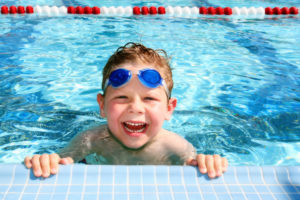
Summer has come around once again. That means kids are no longer spending the majority of their days in a classroom. Instead, they’ll be spending time in any number of other places: at home, at camp, at childcare centers, with family, or outside in the neighborhood. Summer brings with it a lot of opportunity for fun, but as parents, there are certain things you need to look out for. Here are some helpful summer safety tips to keep in mind and help you make the most of this season:
1. Sun Safety
Sunburn is no fun for anyone, including your child. But because kids spend more time outside during the summer, their exposure to the sun increases, and so does their chance for sunburn or other sun damage. Not only can a sunburn be painful, but it can lead to problems down the line. And even if they do not get a burn, damage can occur. The following steps can be taken to avoid injury from the sun:
- Use sunscreen and reapply often. Use a sunscreen with an SPF (sun protection factor) of at least 15 and UVA (ultraviolet A) & UVB (ultraviolet B) protection every time you go outside.
- Cover you and your child’s skin when you go out to protect against UV rays.
- Sunglasses are also important to protect you and your child’s eyes from harsh sunlight.
- Do not be fooled by cloud cover. You can still get sunburn or sun damage if it is cloudy.
2. Water Safety
Keeping kids safe in the water is a huge priority during the summer. Learning and recognizing the signs of drowning is crucial for water safety. Being prepared to act in the worst-case scenario is important. There are other steps to take to ensure water safety:
- Supervise children in and around water at all times. A responsible adult should be constantly watching children. You should still be vigilant when a lifeguard is on duty.
- Install a four-sided fence around home pools. This is in addition to the legally required fence around the yard. These isolation fences should include self-closing and self-latching gates and completely separate the pool area from the house and play area.
- Learn CPR and keep your skills sharp and refresh as necessary.
- Teach kids to swim. Formal swimming lessons can help prevent children from drowning.
- Require children to wear life jackets in and around natural bodies of water even if they can swim. If a child is not a strong swimmer, a life vest can be used at the pool as well.
3. Heat Safety
It’s no secret that the summer months heat up. When it comes to heat safety, it’s important to try and prevent dangerous situations and pay attention to possible warning signs of heat related illnesses. If you experience any of these symptoms or witness them in your child, seek medical help right away.
- Stay cool by swimming (and adhering to safety guidelines above) and taking cool baths and showers.
- Cool, lightweight, light-colored clothing is great for infants, children, and adults.
- Outdoor activities should be scheduled at the coolest times of the day; typically in the mornings and in the evenings.
- Never leave babies, children, pets in parked cars. Even with the windows down the temperature can rise to a dangerous and even fatal level.
4. Hydration
Hydration is crucial all year, but during the summer when kids are sweating more because of heat and physical activity, it’s doubly important. Make sure kids take frequent water breaks. Your child probably will not think to stop and hydrate before activity or during every break, so it is important to remind them to do so and ensure that they get enough water. As a general rule, it is best if they drink throughout the day rather than all at once. And you do not have to wait until they are thirsty to prompt them to drink, because sometimes thirst is a sign that dehydration has already set in.
5. Insect Safety
Bugs can come out in full force during the summer months. Not only are they annoyances that can cause irritating bites, but some may carry diseases. The most common disease-carrying insects are ticks, which carry Lyme Disease among other things, and mosquitos, which may carry West Nile Virus, Zika, and other viruses. There are some steps you should take to protect your kids against insects this summer:
- Use bug spray or insect repellent.
- Some repellents are made with DEET, which is toxic if swallowed. So, if you use a product containing DEET, don’t apply it to your child’s hands or face to avoid the possibility of it getting in their mouth. And always wash any repellent off before bed.
- There are alternatives to DEET, but keep in mind “natural” does not always mean “safe.” Speak to your pediatrician about what is a safe insect repellent to use on your child.
- Never leave stagnant water around your yard and house. Pools of stagnant water are breeding grounds for mosquitos.
- When possible, wear and dress your child in long sleeve shirts and pants when outside in areas where mosquitoes are likely to be present in large numbers. Clothing with SPF-rating is often lightweight and can double as both sun and insect protection.
6. Play Safety
Summer is a perfect time for kids to play to their heart’s content. If your kid is out playing from sun up to when the street lights go on, make sure they use some play safety tips.
- When riding a bike, skating, skateboarding, or otherwise riding a wheeled vehicle, make sure kids wear helmets. Other pads for knees, wrists, and elbows can also be useful for preventing scrapes, cuts and fractures, but a properly fitted helmet can prevent serious head injury, making it a crucial safety precaution.
- When using a trampoline, set firm rules such as the number of children allowed at one time. Kids younger than six should not be allowed on full-size trampolines. Safety nets should be used around trampolines and the trampoline should be positioned away from other play structures.
- Make sure play equipment in your yard is safe for use and the ground beneath it is soft enough to absorb the impact of a fall.
- When children are playing games like hide-and-seek in your yard or in your home, make sure they know that it’s unsafe to hide in enclosed spaces. This includes car trunks, chests, old coolers, or other appliances.
At HealthPark Pediatrics in Raleigh, we strive to give our patients education on recommended care so that you can be an active participant in your child’s healthcare plan. In addition to sharing tips like the ones above, we believe in working to provide preventative healthcare. The key to raising a healthy child is early recognition of issues through appropriate screening. To make an appointment with us, call (919) 896-7066.









